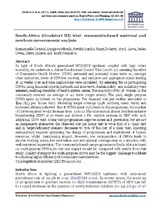South-Africa (Goodstart III) trial: community-based maternal and newborn care economic analysis

View/
Date
2017Author
Daviaud, Emmanuelle
Nkonki, Lungiswa L.
Ijumba, Petrida
Doherty, Tanya
Lawn, Joy E.
Owen, Helen
Jackson, Debra
Tomlinson, Mark
Metadata
Show full item recordAbstract
In light of South Africa’s generalized HIV/AIDS epidemic coupled with high infant mortality, we undertook
a cluster Randomized Control Trial (2008–10) assessing the effect of Community Health Worker
(CHW) antenatal and postnatal home visits on, amongst other indicators, levels of HIV-free survival,
and exclusive and appropriate infant feeding at 12 weeks. Cost and time implications were calculated,
by assessing the 15 participating CHWs, using financial records, mHealth and interviews. Sustainability
and scalability were assessed, enabling identification of health system issues. The majority (96%) of
women in the community received an average of 4.1 visits (target seven). The paid, single purpose
CHWs spent 13 h/week on the programme. The financial cost per mother amounted to $94 ($23 per
home visit). Modelling target coverage (95% mothers, seven visits) and increased efficiency showed
that if CHWs spent 25h/week on the programme, the number of CHWs required would decrease from
15 to 12. The intervention almost doubled exclusive breastfeeding (EBF) at 12 weeks and showed a 6%
relative increase in EBF with each additional CHW visit. Home visit programmes improve access and
prevention but are not an inexpensive alternative: the observed cost per home visit is twice that of a
clinic visit and in target/efficiency scenario decreases to 70% of the cost of a clinic visit. Ensuring sustainability
requires optimizing the design of programmes and deployment of human resources, whilst
maintaining impact. However, low remuneration of CHWs leads to shorter working hours, low motivation
and sub-optimal coverage even in a situation with well-resourced supervision. The communitybased
care programme in South-Africa is based on multi-purpose CHWs, its cost and impact should be
compared with results from this study. Quality of support for multi-purpose CHWs may be the biggest
challenge to address to achieving higher efficiency of community-based services.
